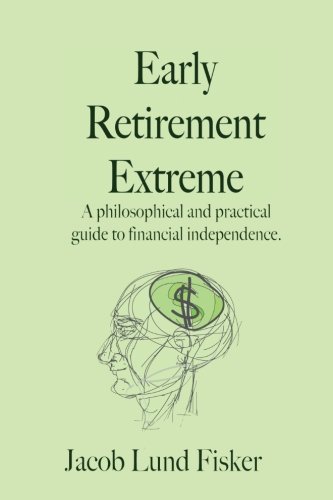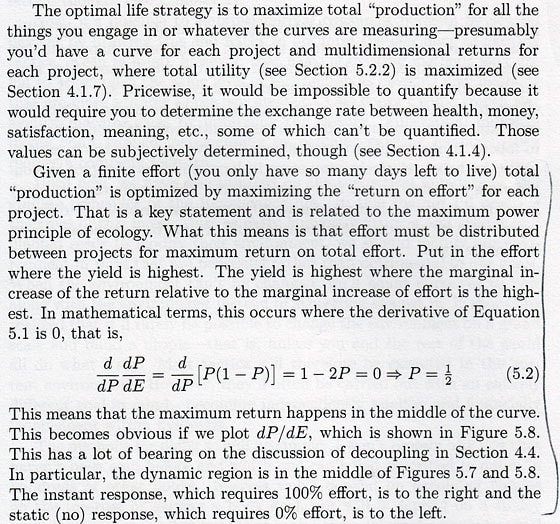Book review: Early Retirement Extreme

No surprise then that over the last couple of months I’ve been obsessed with Jacob Lund Fisker’s Early Retirement Extreme blog. And no surprise that my first book review since September is of Fisker’s book, also called Early Retirement Extreme.
Early Retirement Extreme
Imagine a personal finance book written by a theoretical physicist. What would it be like? Full of formulas and figures, right? Well, that’s what you get with Early Retirement Extreme. But you get more, too.
Fisker’s story and style are unique. After graduating with a PhD in theoretical physics, he worked for five years as a research associate. For that five years, he saved 75% of his net (after tax) income. Fisker reached financial independence at 30 and then, at age 33, he retired. (How does Fisker define financial independence? By the time he was 30, he’d saved the equivalent of 25 years of living expenses. That’s a 25-year emergency fund.)
While many people think you need to earn big bucks to retire early, Fisker did it differently. Instead of boosting income, Fisker cut costs drastically. While drawing an average salary, he learned to live on less. Much less. He started to do things himself. (He wrote, edited, and published this book, for example.) His pre-retirement lifestyle and post-retirement lifestyle are essentially the same. Except now he doesn’t have to work.
Early Retirement Extreme feels like a book written by an engineer for other engineers. This isn’t a bad thing, but it is unique. Some people will love it; others will hate it.
Here’s a scan from page 111 to show what I mean:

While this sort of thing isn’t on every page, there’s still plenty of it in the book. Because Fisker is (or was) a theoretical physicist, his book is filled with formulas and figures. If this bugs you, Early Retirement Extreme probably isn’t a good choice. I found these passages amusing. Instead of letting the math intimidate me (my only college math course was behavioral statistics, and that was over twenty years ago), I glossed over it looking for the core concepts the book was trying to convey. (In the example above, “spend your time and energy on the things that will give you the biggest returns”.)
Fisker’s technical mind manifests itself in other ways. When writing about how to save money in the kitchen, for instance, he approaches it as an optimization problem. How do you choose what food to buy? Fisker writes, “The most optimal method is to shop for ingredients, and then, based on the ingredients one has available, determine a recipe.” In other words, start with what you have (or what’s on sale) and go from there. Learn to improvise. And optimally, you wouldn’t have a stovetop or a refrigerator. (You would have a slow cooker and a chest freezer, though.)
But Early Retirement Extreme is more than just a personal finance book filled with formulas and figures. It’s also philosophical.
Philosophical Extreme
In many ways, Early Retirement Extreme is a book of philosophy. Fisker doesn’t set out to give you a step-by-step map to wealth; instead, he tries to give you the tools to draw your own map. He wants readers to think about their choices and about the world around them. He wants to challenge their assumptions about what’s financially feasible.
When I say this is a book of philosophy, I don’t mean that in some vague metaphorical sense. I meant it literally. To challenge his readers’ assumptions, Fisker begins the book by exploring Plato’s allegory of the cave.
Plato’s allegory of the cave — like The Matrix for ancient Greeks
We’re like prisoners chained in a cave, Fisker says, except that we’re chained to our jobs, our expensive homes, the things we own. We don’t even realize there’s any other way to live. But it doesn’t have to be this way. “By taking the other end of the bargain, saving as much as other people are spending on wants, it’s possible to retire and live on invested savings after just five years of full-time work.”
Fisker notes that there are plenty of people who will dismiss this idea as crazy:
The most frequent objection to casting off the chains is that living on something corresponding to every third paycheck, or even every fourth paycheck ($6,000 to $10,000 a year), as opposed to living paycheck to paycheck, must be a boring life. Not knowing any better, I must admit that I started my own adventure with such assumptions.
[…]As a lifelong consumer used to spending large amounts of money to obtain food, stuff, and entertainment, it’s hard to imagine how it’s possible to spend practically nothing on furniture, a few dollars on clothing, very little on food, almost nothing on transport, and generally less on rent/mortgage. However, it’s possible to live on a third or even a quarter of the median income, putting one solidly below the government defined poverty line, without living in austerity and eating grits.
This philosophical underpinning sets Early Retirement Extreme apart. The book (and the blog) are unlike any other financial material I’ve ever read. Yes, some books — including Your Money or Your Life or even my own Your Money: The Missing Manual — contain bits of philosophy, but not like this. At times, the philosophical bent is overwhelming.
Putting Theory into Practice
The first half of Early Retirement Extreme establishes a philosophical framework with which to evaluate your relationship to money. After he sets the stage, Fisker spends the last half of the book explaining how to put this theory into practice, how to work toward extreme early retirement.
In some ways, for instance, Fisker is like the opposite of Tim Ferriss. In The 4-Hour Workweek, you’ll remember, Ferriss advocated “outsourcing” as much of your life as possible in order to give yourself more time to do the things you want. Fisker thinks this is nuts.
“People spend eight hours a day for 30 years to buy electric can openers,” Fisker writes. (An electric can opener is one degree of outsourcing.) “The solution is to reverse the outsourcing of ordinary life skills and gradually insource skills that were previously acquired in the marketplace.” He urges readers to mend their own clothes, grow a garden, cook their own food, walk and bike for transportation, and so on.
Some parts of Early Retirement Extreme are brilliant. For instance, the six pages on “construction methods” (by which Fisker means using life skills to solve problems) are some of the best I’ve ever read about the value of doing things yourself. Fisker doesn’t actually tell the readers how to do anything; instead, he provides a framework for problem solving.
And I love the section on deciding which things to own. Fisker says that the stuff you buy should:
- Have “appropriate quality” and a low lifetime cost.
- Be durable.
- Be easy to dispose of.
- Be small and lightweight.
- Be easy to make.
- Be easy to service.
“For commonly used items,” Fisker writes, “a higher quality tends to pay off in the long run.” After years of frugality, I finally figured this out. Yes, it hurts to pay more for a quality item. But if it lasts, it’s worth it. (As Fisker notes, being willing to pay for quality is one of the differences between being frugal and cheap.)
Fisker also writes, “Only a fraction of the things we own contribute to our actual quality of life. These are the things we use on a daily basis.” Instead of owning lots of Stuff, why not focus on making sure the the things we use all the time are well made and a pleasure to use?
Not Without Flaw
My chief complaint with Early Retirement Extreme is that the book could use an editor. Fisker writes well, but he tends to repeat himself at times. He uses long paragraphs. There are (minor) contradictions and typos here and there. An editor would help smooth some of these things — but an editor is anathema to Fisker’s philosophy.
Also, although Fisker writes with an authoritative and persuasive voice, I’m not convinced he’s always correct. (Fisker dismisses the need to cite his sources, but I think that makes the book weaker rather than stronger.)
The third chapter of Early Retirement Extreme, for instance, discusses “economic degrees of freedom” and includes a financial framework of Fisker’s own creation, which divides people into four categories:
- The salary man — A wage earner with one source of income.
- The working man — A freelancer or consultant with variable income.
- The businessman — A business owner.
- The Renaissance man — A generalist who makes a little money at many different things.
I’m sure these classifications make sense to Fisker, but they don’t make sense to me. I read this section several times and still the labels and differences between the groups seem arbitrary and not based on reality.
Despite my complaints — which are mostly about the book’s style, not its message — I loved Early Retirement Extreme. I don’t agree with everything, but I agree with much of it, and I admire the rest.
Early Retirement Extreme is about strategies, not tactics — it’s about the Big Picture instead of the day-to-day actions needed to retire early. As a result, some readers will be frustrated. But if you’re up to the challenge of filling in Fisker’s framework with your own details, this book could be a life changer.
Become A Money Boss And Join 15,000 Others
Subscribe to the GRS Insider (FREE) and we’ll give you a copy of the Money Boss Manifesto (also FREE)
